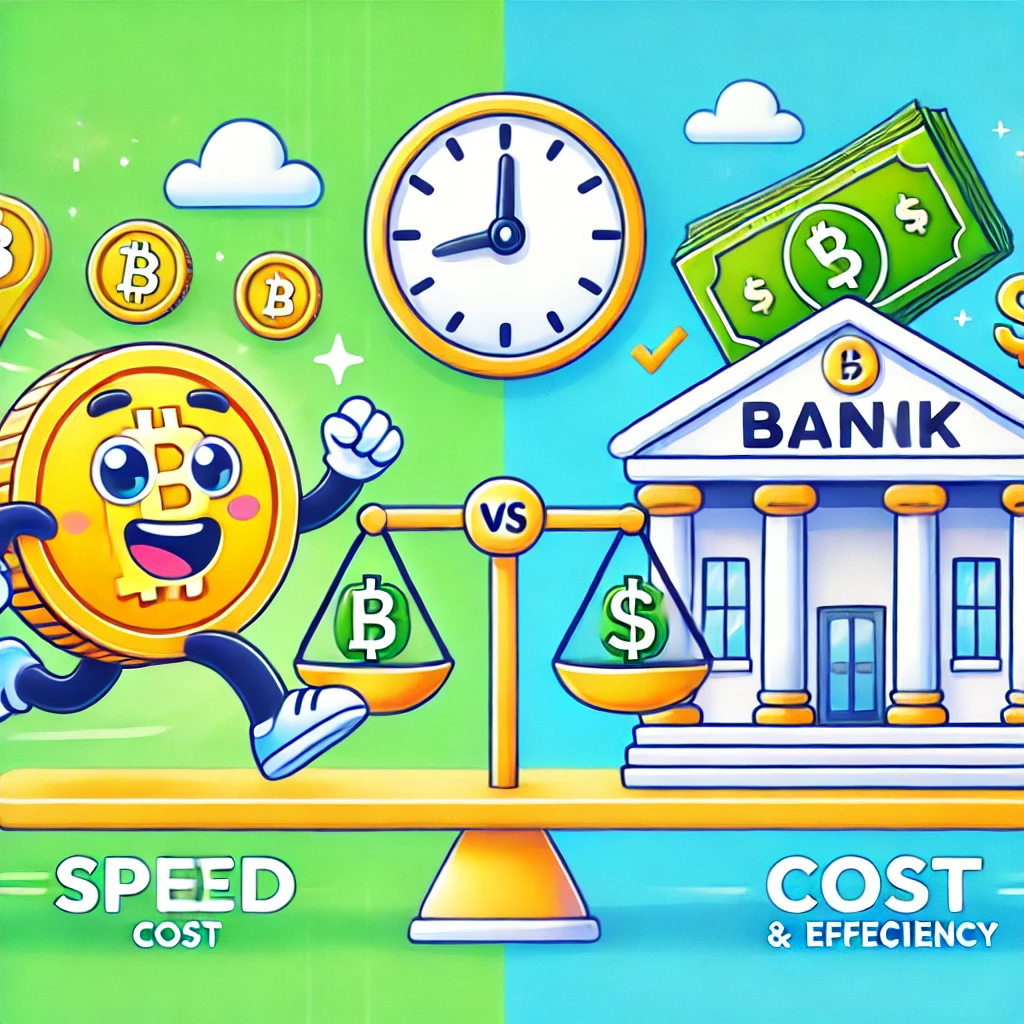
Introduction
With the rise of Bitcoin, many users are now comparing it with traditional bank transfers to determine which is better for their needs. Bitcoin and bank transfers each have unique advantages and drawbacks in terms of speed, cost, efficiency, and security. In this article, we explore these differences in-depth and introduce BTC Accelerate as a solution for users seeking faster Bitcoin transactions.
Speed: How Quickly Do Transfers Complete?
Speed is one of the most significant differences between Bitcoin and traditional bank transfers.
- Bitcoin Transaction Speed: Bitcoin transactions typically take around 10 minutes to confirm, depending on network congestion and transaction fees. High traffic can increase confirmation times, but users can prioritize their transactions with higher fees or use a tool like BTC Accelerate to avoid delays.
- Bank Transfer Speed: Bank transfers vary significantly depending on the type of transfer and the banks involved. Domestic transfers usually take 1-2 business days, while international wire transfers may require 3-5 business days or more due to time zones, banking hours, and intermediary banks.
- Advantage: Bitcoin transactions operate 24/7, allowing transfers at any time, unlike banks, which depend on business hours.
In summary, Bitcoin often provides faster transactions for both domestic and international transfers, especially with the help of a transaction accelerator to ensure speed.
Cost: Transaction Fees and Hidden Charges
Cost is another key factor where Bitcoin and bank transfers differ.
- Bitcoin Transaction Fees: Bitcoin transaction fees vary based on network congestion and the amount of data in the transaction. These fees are often lower than traditional bank transfer fees, especially for cross-border payments. Users can save on costs by setting appropriate fees or using services like BTC Accelerate to achieve faster confirmations without high fees.
- Bank Transfer Fees: Traditional bank transfers typically include various fees, such as:
- Transfer Fees: Banks charge fees for both domestic and international transfers. International transfers are particularly costly, with fees ranging from $15 to $50 or more.
- Currency Conversion Fees: International transfers also incur conversion fees, which increase costs for cross-border payments.
- Hidden Charges: Many banks apply hidden fees, such as intermediary bank charges in the case of international transfers.
- Advantage: Bitcoin’s decentralized network eliminates intermediary fees, making it more cost-effective, especially for international transactions.
Overall, Bitcoin transactions are generally more affordable than traditional bank transfers, particularly for global transactions where bank fees add up quickly.
Efficiency and Accessibility
Bitcoin and traditional bank transfers also differ in terms of efficiency and accessibility.
- Bitcoin’s Efficiency and Global Reach: Bitcoin operates on a decentralized network that allows anyone with internet access to send and receive funds worldwide. There are no intermediaries, which means Bitcoin transactions are efficient and accessible to anyone, even those without access to traditional banks. Users can also use BTC Accelerate to further enhance transaction speed and efficiency.
- Bank Transfer Efficiency: Bank transfers rely on established banking networks and often require identification, documentation, and multiple intermediaries. The traditional banking system is also limited by business hours, holidays, and international time zones, making it less accessible for those needing immediate or frequent transfers.
- Advantage: Bitcoin provides greater accessibility, especially for users in regions with limited banking infrastructure. Its peer-to-peer network allows users to transact without barriers.
In terms of accessibility, Bitcoin stands out as a more efficient and widely accessible option, particularly for underserved populations.
Security and Transparency
Security and transparency are essential in any financial transaction. Bitcoin and traditional banking offer different security models.
- Bitcoin Security: Bitcoin transactions are secured by cryptographic protocols and the decentralized blockchain. Once confirmed, a transaction cannot be reversed, which reduces fraud. Bitcoin also offers transparency, as all transactions are recorded on the public blockchain, making them visible to anyone.
- Bank Transfer Security: Banks use centralized systems to manage and secure funds, often with strong security protocols. However, centralized systems can be vulnerable to hacking or insider fraud. Banks also have the authority to reverse transactions, which provides flexibility but also risks fraud for sellers.
- Advantage: Bitcoin’s decentralized and transparent model offers security and minimizes fraud risks, but it lacks the transaction reversal option available in traditional banking.
In summary, Bitcoin provides a secure, transparent network, while traditional banks offer security but with more centralized control and potential reversal options.
BTC Accelerate: A Tool for Faster Bitcoin Transactions
For Bitcoin users concerned about transaction delays, BTC Accelerate offers a practical solution. BTC Accelerate helps users achieve faster transaction confirmations by working with major mining pools to prioritize rebroadcasted transactions. Here’s how BTC Accelerate improves Bitcoin transaction speed:
- Direct Mining Pool Partnerships: BTC Accelerate collaborates with large mining pools to ensure rebroadcasted transactions receive priority. This feature helps users bypass network congestion and achieve faster confirmations, even during peak times.
- Flexible Service Options: BTC Accelerate offers both a free Bitcoin accelerator option and a premium service. The free option suits non-urgent transactions, while the premium service provides high-priority processing for users needing immediate confirmation.
- User-Friendly Interface: BTC Accelerate’s easy-to-use interface only requires users to enter their transaction ID to initiate acceleration, making it accessible for all experience levels.
BTC Accelerate’s services help users enjoy Bitcoin’s advantages over traditional banking by ensuring timely, reliable confirmations.
Conclusion
Bitcoin and traditional bank transfers each have distinct advantages and limitations. Bitcoin excels in speed, cost-efficiency, and accessibility, especially for cross-border transactions. Traditional bank transfers, while secure and widely accepted, are often slower and involve multiple fees.
BTC Accelerate offers Bitcoin users a solution to speed up transactions, making Bitcoin even more competitive against traditional transfers. With BTC Accelerate, users can enjoy faster confirmations without relying solely on high fees.
Whether you prefer the flexibility of Bitcoin or the established system of banks, understanding these differences allows you to make informed choices for each transaction. With tools like BTC Accelerate, Bitcoin users have even more options to maximize speed, minimize cost, and enjoy an efficient financial experience.
